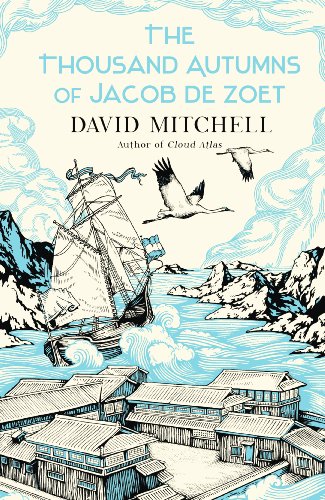Our book group choice for May 2015 is The Thousand Autumns of Jacob de Zoet by David Mitchell. In 1799, Jacob de Zoet disembarks on the tiny island of Dejima, the Dutch East India Company’s remotest trading post in a Japan otherwise closed to the outside world. A junior clerk, his task is to uncover evidence of the previous Chief Resident’s corruption.
Cold-shouldered by his compatriots, Jacob earns the trust of a local interpreter and, more dangerously, becomes intrigued by a rare woman—a midwife permitted to study on Dejima under the company physician. He cannot foresee how disastrously each will be betrayed by someone they trust, nor how intertwined and far-reaching the consequences.
Duplicity and integrity, love and lust, guilt and faith, cold murder and strange immortality stalk the stage in this enthralling novel, which brings to vivid life the ordinary—and extraordinary—people caught up in a tectonic shift between East and West.
Discussion Questions for The Thousand Autumns of Jacob de Zoet
- Have you finished the book? Was it a struggle or did you relish every page?
- Does the extensive cast list add to, or distract from the narrative? Was it necessary?
- The book starts with a difficult birth described in gruesome detail. Was the description too graphic and did the portrayal of the birth in such gory detail serve any purpose in the book? Or was it just for dramatic effect?
- Jacob comes across as a ‘moral’ character. He refers to ‘moral bookkeeping’ and cares about honesty and integrity. So is it plausible that he should fall for Orito when he has Anna waiting for him at home?
- One of the book’s themes is Enlightenment and the development of science, versus the old traditional ways and superstition. How did the various Japanese and European characters embrace both ways of thinking? Was it a clear cut East/West split?
- How does Jacob’s Christian faith marry with his interest in Enlightenment?
- There are a few acts of moral bravery in the book to discuss:
- Orito almost escapes from the shrine but chooses to return. Why did she go back and do you think she did the right thing?
- Ogawa tries to mount a rescue, but in doing so must leave his family behind forever and face an uncertain future. Is he naïve or brave?
- Jacob’s honesty means he is unwilling to fall in with his corrupt Dutch counterparts. Why does he take the more difficult, but more moral line?
- The magistrate ultimately chooses to murder Enomoto and expose the true purpose of the shrine. Is this brave or does he have nothing to lose?
- Fate versus choice is another theme of the book. Is this the same as tradition versus science?
- How did the 3 parts of the book work for you? Was it a good structure or did it hamper the flow? Many of the chapters end with “…” and leave you hanging at a crucial moment. Was this a good device?
- Was the writing even-handed in its treatment of the Japanese and European cultures? Did you find some of the characters stereotypical?
- What purpose, if any, did you think the monkey William Pitt served in the story?
- The writing style often had dialogue interspersed with some other action going on. For example a card game or playing billiards. Did you find these passages difficult to read?
- Another theme seems to be fathers and sons, or mentors and acolytes. Did the seniors all let their children/pupils down? Were there any signs that the next generation be any better?
- Does the appearance of a British ship in part 3 add a new dimension to the story or were they just another set of “Europeans”? Or was this a device used to bring the story to a suitable conclusion? (Whilst adding even more characters to the cast)
- The last stand of Jacob and Marinus at the watchtower. Was this a show of patriotism or was self-interest at play? Fate or choice?
- Were you satisfied with the ending? Do you think Jacob was happy to leave Japan or did he just resign himself to his fate? Did he have regrets?
- Would you recommend this book to anyone?
Individual Ratings
DKB's Rating 




Catherine's Rating 




Sue's Rating 




Miranda's Rating 




Anthony's Rating 




EmmaC's Rating 





